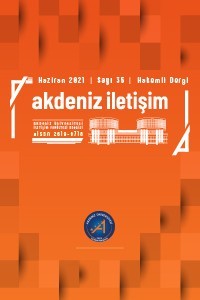Egemen Medyanın Yeni İletişim Teknolojileri Dolayımıyla “Bypass” Edilmesi: Türkiye’de Bir Devlet Kurumunun Karşı Karşıya Kaldığı Olanaklar ve Zorluklar
Yeni medya, egemen medyayı ‘bypass’ etmek isteyen kurum ve kuruluşlar için kendi kurumsalözerk haberlerini oluşturma olanağı sunmaktadır. Bu makalede, ‘yeni medyanın esnek olanakları’ olarak bahsedilen şey, siyasal aktörlerin yeni medya üzerinden kamularıyla iletişimi ilişkisidir. Siyasal aktörlerin geleneksel medyadaki temsili, siyasal iletişimde amaçladıklarıyla gerçekleşen arasında çoğu zaman bir fark içermekte ve bu durum, adı geçen aktörler için olumsuz siyasal sonuçları üretmektedir. Sonuçta egemen medyanın yapısal tarafgirliği, ‘muhalif’ siyasetin iletişiminde kesinti yaratmakta, aynı zamanda da ‘yeni medyanın esnek olanaklarını’ biçimlendirmektedir. Bu durum, bir örnek olay niteliği kazanan, Türk Silahlı Kuvvetleri’nin (TSK), 27 Nisan 2007 tarihinde Internet üzerinden yayımladığı ‘e-Bildirge’ üzerinden tartışılacaktır. Bu örnek, yeni medya olanaklarının, kurumsal-özerk haber oluşturmayı kolaylaştırarak egemen medyayı ‘bypass’ etmelerine imkan tanıdığı argümanını desteklemektedir
Anahtar Kelimeler:
Yeni Medya, e-Bildirge, yeni medyanın esnek olanakları, siyasal iletişim, siyasal strateji
Bypassing The Dominant Media By The ICTS: The Opportunities and Challenges facing a State Institution in Turkey
The new media presents the opportunity of preparing institutional-autonomous news for the organisations that wish to ‘bypass’ the dominant media. In this article, ‘flexible new media opportunities’ is the relationship-communication of the political actors with their public through the media. The representation of the political actors in the dominant media often creates a gap between what these actors aim to convey in terms of political communication and what actually happens. Consequently, the interruption of the structural partiality of the dominant media creates within the communication of the ‘opponent’ politics and also shapes ‘flexible new media operations’. This situation will be exemplified with a case study of the ‘e-Memorandum’ 27 April 2007 that the Turkish Armed Forces (TAF) issued over the Internet. This example supports the argument that the new media opportunities facilitate the preparation of institutional-autonomous news that allows organisations and institutions to bypass the dominant media
Keywords:
New media, e-Memorandum, Flexible Media Opportunities, Political Communication, and Political Strategy,
___
- Castells, M. (1996). The Rise of the Network Society, Oxford: Blackwell Publishing.
- Chomsky, N. vd., (2004). Medyanın Kamuoyu İmalatı [Necessary Illusions: Thought Control in Democratic Societies], Istanbul: Çiviyazıları.
- Gramsci, Antonio (1971). Selections from the Prison Notebooks, London: Lawrence and Wishart.
- Jessop, B. (2005). Hegemonya, Post-Fordizm ve Küreselleşme Ekseninde Kapitalist Devlet [Hegemony, PostFordism
- Globalization and Capitalist State based on Globalization], İstanbul: İletişim Publishing House.
- Meyer, T. (2002). Medya Demokrasisi [Media democracy: how the media colonize politics] Istanbul: Turkish İş Bank Cultural Publications.
- Nissen, C. S. (2006). Public Service Media in the Information Society Report, Council of Europe’s Group of Specialists on Public Service Broadcasting in the Information Society (MC-S-PSB).
- Pratt, A. C. (2000). “New media, the new economy and new spaces”. Geoforum, 31: 425-436.
- Törenli, N. (2005). Yeni Medya, Yeni İletişim Ortamı [New Media and New Communication Order], Ankara: Bilim-Sanat Publications.
- Turunc, H. (2007). “Islamicist or Democratic? The AKP’s Search for Identity in Turkish Politics”, Journal of Contemporary European Studies, 15, 1: 79-91.
- Van Dijk, T. A. (2005). “Söylemin Yapıları ve İktidarın Yapıları” [The Constructor of Discourse and Power] (in) Medya, İktidar, İdeoloji [Media, Power and Ideology], Mehmet Koçak (ed.), Ankara: Bilim & Sanat Publications. 315-375.
- Weber, M. (1947). The Theory of Social and Economic Organization, [translated by Henderson, A.M. & Parsons, T.], London: Collier Macmillan Publishers.
- Webster, F. (2006). Theories of the Information Society, London: Rutledge.
- Uzun, R. (2007). İletişim Etiği, Sorunlar ve Sorumluluklar [Communication Ethics, Challenges and Responsibilities]
- Ankara: Gazi University Communication Faculty 40Th Year Library No: 2.
- Virillo, P. (1998). “Military space”, The Virillo Reader, Derran, J. (Ed.), Oxford: Blackwell.
- Yıldız, N. (2007). Tanklar ve Sözcükler [Tanks and Words], İstanbul: Alfa Publications.
- Yayın Aralığı: Yılda 3 Sayı
- Başlangıç: 2003
- Yayıncı: Akdeniz Üniversitesi
